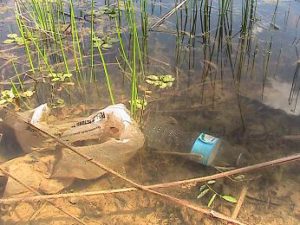Our DNA has been polluted by the presence of sin in this world and in our lives; however, our DNA is robust and will serve us until the resurrection.
Since the discovery of DNA, there has been much talk about “junk DNA.” Initially, “junk DNA” was publicized as comprising at least 98 % of human DNA. Researchers didn’t pay much attention to it and considered it a waste of time researching “junk.” However, with the recent findings of the ENCODE (Encyclopedia of DNA Elements) (1) project, the term “junk DNA ” has lost its momentum. Much of the supposed “junk DNA” has been found to be vital for life. The latest estimate of the amount of “junk DNA” is at most 20%. (2) And, this 20% is not necessarily considered to be junk but rather DNA that is not “well understood.” (3)
So, how does this concept of “junk DNA” fit into the Bible. First of all, we, at Genesis and Genetics, have a problem with the use of the term “junk DNA.” The word junk implies that something is old, discarded and no longer useful. We do not accept any tenets of evolution, so we do not accept the implication that any DNA has been discarded due to evolutionary processes. For us, the term “junk DNA” should be replaced by the terms ” polluted DNA,” “redundant DNA,” and “inactive DNA.” The following details present our view on the human genome from a perspective of this “junk DNA” issue:
Polluted DNA It is a fact that we have genetic mutations; some cause disease and some cause deformation. There are some mutations  that appear to have no effect on us, but they pollute the original divine work of the Creator. The Creator proclaimed that everything
that appear to have no effect on us, but they pollute the original divine work of the Creator. The Creator proclaimed that everything
was “very good” on day 6 of the creation (Genesis 1:31). Then, when Adam sinned, things went downhill (Romans 5:12). Now our “very good” DNA is subject to a sinful world filled with pollution and chaos. Our DNA did not escape and is now also polluted (Romans 5:21).
Redundant DNA Anyone who has spent much time on a computer knows how important it is to have more than one way of doing things and having more than one copy of files. The key idea here is redundancy. DNA mechanisms are quite redundant, and this redundancy is important for a robust design. Our DNA is in the form of a double helix: it contains two copies of everything required for life. Also, There are multiple genes that can do the same task. And, there are “cut and paste” genes (transposons) which provide backup copies at multiple locations. This redundancy allows us to endure the abovementioned polluted DNA, but continue to live. The human body is robust and wonderfully made:
Psalm 139:14 I praise you, for I am fearfully and wonderfully made. Wonderful are your works . .
Inactive DNA We are all presently mortal due to Adam’s sin (Genesis 3:3). However, Jesus has promised us that we would be redeemed and our immortality would be restored. Someday soon Jesus will hit the “restore” button and those who are in Christ (Romans 8:2) will be like Him and our entire genome will be redeemed. Please read:
1 Corinthians 15:52 In a moment, in the twinkling of an eye, at the last trump: for the trumpet shall sound, and the dead shall be raised incorruptible, and we shall be changed.
1 Corinthians 15:53 For this corruptible must put on incorruption, and this mortal must put on immortality.
In summary, do we have junk DNA? No, but we do have redundant DNA, polluted DNA and inactive DNA. Our present DNA is robust and will serve us while we wait for our redemption.
Keywords: junk DNA, Bible, junk DNA in the Bible, Bible junk DNA, would God make junk
References:
1. http://science.sciencemag.org/content/337/6099/1159
2. Doolittle WF. Is junk DNA bunk? A critique of ENCODE. Proceedings of the National Academy of Sciences of the United States of America. 2013;110(14):5294-5300. doi:10.1073/pnas.1221376110.
3. http://www.imm.ox.ac.uk/not-all-junk-dna-is-rubbish

Good read, and you are correct, I have no junk DNA, because GOD don’t make junk!!!
https://archive.org/details/plague-of-corruption/page/n169/mode/1up/search/animal
Now we have proof regarding where the “junk” dna really came from!!
https://owndoc.com/lyme/multiple-sclerosis-is-lyme-disease-anatomy-of-a-cover-up/
https://www.bibliotecapleyades.net/esp_autor_horowitz.htm#Books-Treaties
https://www.globalresearch.ca/military-vaccine-mandates-defense-purchasing-500-million-apiject-syringes-inject-every-person-america-coronavirus-vaccine/5712859
https://drive.google.com/file/d/14EayeiBSNEYNHrfW16Hq7vpRJ7JnTFiB/view?usp=sharing